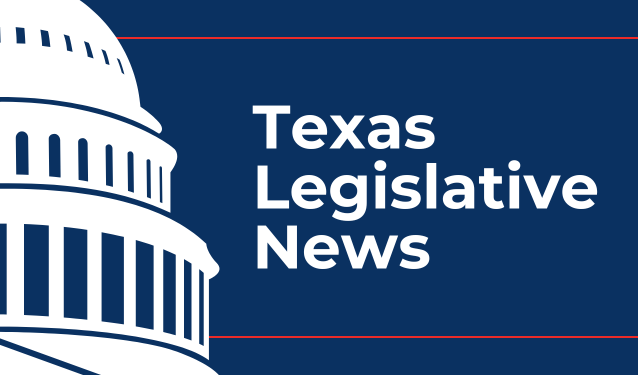

Table of Contents
Welcome to the latest edition of Texas Legislative News for the 89th Texas Legislature. In this regular feature, we provide information on disability-related issues and bills under consideration at the State Capitol. We also explain how lawmakers conduct business, and we share details on upcoming TCDD events.
With the legislative session now over, we’re taking stock of what happened in the session’s final days and sharing outcomes that might impact people with developmental disabilities (DD). This week, we focus on personal and civil rights.
What Did Lawmakers Do About Personal & Civil Rights?
TCDD adopted the following public policy priority on personal and civil rights for the legislative session: Increase the protections for the personal and civil rights of Texans with disabilities. Texans with disabilities deserve to understand and exercise their personal and civil rights in order to lead safe and successful lives as independently as possible, and they deserve equal protection when their rights are infringed upon.
Here are some of the proposed measures we tracked that related to this priority.
Guardianship and Supported Decision-Making
Our Council’s position statements support “increasing opportunities for and protecting the self-determination and civil rights of people with developmental disabilities. Independent or supported decision-making must be the first and preferred option for people with DD, including when guardianship is being explored.”
The guardianship process can be complex. Lawmakers file bills during every legislative session to refine the process and better protect and serve the needs of people who are in guardianships. The following guardianship measures passed both chambers of the Legislature during the recent session:
- Senate Bill (SB) 746, by Sen. Judith Zaffirini, authorizes judges to appoint “guardians ad litem” to represent the interests of people who might be placed into guardianships during legal proceedings. The bill also bans people with interests adverse to a person under guardianship from seeking the appointment, removal, or contesting the removal of that person’s guardian. SB 746 was signed into law and takes effect on Sept. 1, 2025.
- House Bill (HB) 3376, by Rep. Giovanni Capriglione, would require annual one-hour training for certain guardians on aging, Alzheimer’s disease, dementia, and related disorders. The bill would apply in instances where a person under guardianship is 60 years of age or older, or where a person under guardianship is younger than 60 and has been diagnosed with Alzheimer’s disease, dementia, or a related disorder. HB 3376 awaits Gov. Greg Abbott’s signature into law. The governor must sign, veto, or let the bill pass into law without his signature no later than June 22.
Supported decision-making is an alternative to guardianship that gives people with disabilities support to make decisions without taking away their rights. A supported decision-making agreement (PDF) is a legal document for adults with disabilities or those with specific health care needs. The agreement details the help a person would need from a supporter. People in supported decision-making agreements must enter into them voluntarily and without influence or coercion. Agreements can be terminated by either party at any time.
In 2015, Texas became the first state in the nation to offer supported decision-making. Since then, nearly two dozen states have enacted a legal framework recognizing supported decision-making agreements.
This session, Texas lawmakers passed the following measure related to supported decision-making:
- SB 66, by Sen. Judith Zaffirini, would require a study on authorizing supported decision-making agreements to include assistance in legal proceedings. This bill was featured as a TCDD Bill of the Week. SB 66 awaits the governor’s signature into law.
Criminal Justice and Public Safety
“People with DD — whether as victims, suspects, or witnesses of a crime — have the right to impartial justice, fair treatment, and reasonable accommodations in all areas of the criminal justice system,” according to TCDD’s position statements.
People with DD are disproportionately represented in the U.S. criminal justice system. Advocates argue this disparity underscores a systemic failure to support people with DD before, during, and after incarceration. This session, the Legislature passed the following measure related to criminal justice and people with DD:
- HB 2756, by Rep. Senfronia Thompson, requires training on de-escalation, crisis intervention, and behavioral health for correctional officers and certain other employees of the Texas Department of Criminal Justice. The bill requires the training to include “increased awareness of persons with behavioral health concerns, substance use disorders, or intellectual and developmental disabilities.” HB 2756 was signed into law and takes effect on Sept. 1, 2025.
Here are some notable bills related to criminal justice and people with DD that failed to pass during the session:
- HB 688, by Rep. Senfronia Thompson, and SB 432, by Sen. Borris Miles, would have banned the death penalty for people convicted of capital offenses who are found to have intellectual disabilities.
- HB 1995, by Rep. Ana Hernandez, and HB 2089, by Rep. Armando “Mando” Martinez, would have allowed vehicle registrations to include a notification to a peace officer that the vehicle owner may be transporting a person with a disability.
- HB 2777, by Rep. Toni Rose, would have banned the death penalty for people convicted of capital offenses who are found to have severe mental health conditions.
- HB 2929, by Rep. Mano DeAyala, would have required peace officers to take a training course on interacting with people with autism.
- HB 3834, by Rep. Joe Moody, and SB 828, by Sen. Tan Parker, would have strengthened support for the reentry and reintegration of incarcerated people with intellectual disabilities. HB 3834 was featured as a TCDD Bill of the Week.
Elections
Measures to make voting more accessible for people with disabilities were generally unsuccessful this session. Here are some bills on the issue that failed to pass:
- HB 522, by Rep. Terry Meza, would have required the development of an online tool allowing voters with disabilities to complete applications for mail-in ballots and mark ballots online with the use of assistive technology.
- HB 1152, by Rep. Penny Morales Shaw, would have allowed electronic or photocopied signatures on ballot envelopes as a reasonable accommodation for voters with disabilities who are unable to sign by hand.
- HB 3162, by Rep. Jeff Leach, would have required the development of an accessible absentee ballot system for voters with disabilities.
The following elections-related bill has been sent to the governor and awaits signature into law:
- HB 521, by Rep. Ryan Guillen, would tighten regulations regarding voters who are unable to enter a polling place and instead use curbside voting, as well as for people who provide assistance or transportation to voters with disabilities.
Join TCDD for a Capitol Recap on Disability Policy
On Wednesday, June 25, TCDD will host a Disability Policy Academy titled “A Capitol Recap: Disability Policy in the 89th Legislature.” The free event is open to the public and will feature:
- an overview of new disability-related laws;
- a summary of disability issues that remain unaddressed;
- a discussion on topics lawmakers may cover in the legislative interim; and
- a Q&A session with TCDD’s public policy analysts and other disability advocates.
Participating organizations include the Autism Society of Texas, the Coalition of Texans with Disabilities, Texas Advocates, and Texas Parent to Parent.
The event will be held via Zoom. Participants must register ahead of time to attend. TCDD will provide Communication Access Real-time Translation (CART) service. If you need other accommodations to participate, please indicate that when registering and email Koren Vogel or call her at 512-948-2035.
Date: Wednesday, June 25
Time: 1-2:30 p.m. Central Time
Stay Informed
Stay up to date on how lawmakers address disability issues by following us on Facebook, X, Instagram, and LinkedIn. You can also check out our Policy section to learn more about our legislative engagement and find resources to support your own advocacy.
